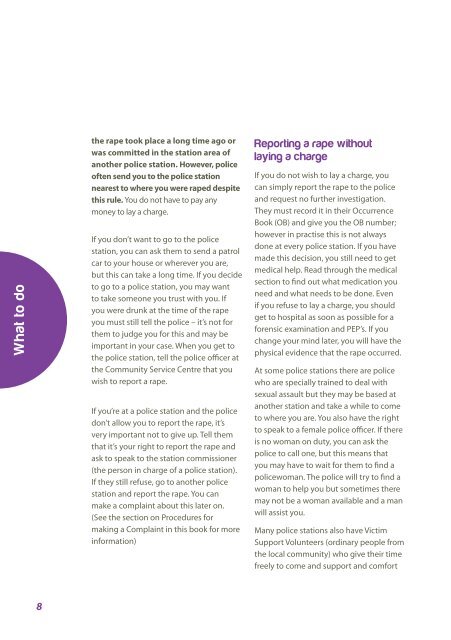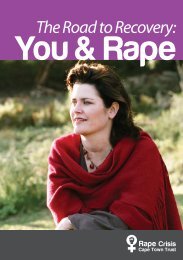Subtitle? - Rape Crisis
Subtitle? - Rape Crisis
Subtitle? - Rape Crisis
Create successful ePaper yourself
Turn your PDF publications into a flip-book with our unique Google optimized e-Paper software.
What to do<br />
if someone has raped you<br />
What to do<br />
the rape took place a long time ago or<br />
was committed in the station area of<br />
another police station. However, police<br />
often send you to the police station<br />
nearest to where you were raped despite<br />
this rule. You do not have to pay any<br />
money to lay a charge.<br />
If you don’t want to go to the police<br />
station, you can ask them to send a patrol<br />
car to your house or wherever you are,<br />
but this can take a long time. If you decide<br />
to go to a police station, you may want<br />
to take someone you trust with you. If<br />
you were drunk at the time of the rape<br />
you must still tell the police – it’s not for<br />
them to judge you for this and may be<br />
important in your case. When you get to<br />
the police station, tell the police officer at<br />
the Community Service Centre that you<br />
wish to report a rape.<br />
If you’re at a police station and the police<br />
don’t allow you to report the rape, it’s<br />
very important not to give up. Tell them<br />
that it’s your right to report the rape and<br />
ask to speak to the station commissioner<br />
(the person in charge of a police station).<br />
If they still refuse, go to another police<br />
station and report the rape. You can<br />
make a complaint about this later on.<br />
(See the section on Procedures for<br />
making a Complaint in this book for more<br />
information)<br />
Reporting a rape without<br />
laying a charge<br />
If you do not wish to lay a charge, you<br />
can simply report the rape to the police<br />
and request no further investigation.<br />
They must record it in their Occurrence<br />
Book (OB) and give you the OB number;<br />
however in practise this is not always<br />
done at every police station. If you have<br />
made this decision, you still need to get<br />
medical help. Read through the medical<br />
section to find out what medication you<br />
need and what needs to be done. Even<br />
if you refuse to lay a charge, you should<br />
get to hospital as soon as possible for a<br />
forensic examination and PEP’s. If you<br />
change your mind later, you will have the<br />
physical evidence that the rape occurred.<br />
At some police stations there are police<br />
who are specially trained to deal with<br />
sexual assault but they may be based at<br />
another station and take a while to come<br />
to where you are. You also have the right<br />
to speak to a female police officer. If there<br />
is no woman on duty, you can ask the<br />
police to call one, but this means that<br />
you may have to wait for them to find a<br />
policewoman. The police will try to find a<br />
woman to help you but sometimes there<br />
may not be a woman available and a man<br />
will assist you.<br />
Many police stations also have Victim<br />
Support Volunteers (ordinary people from<br />
the local community) who give their time<br />
freely to come and support and comfort<br />
people who have been victims of violent<br />
crimes such as rape. They have been<br />
specially trained and will be able to tell<br />
you what to expect and they will help you<br />
in any way that they can. They will usually<br />
take you to a Victim Support Room, which<br />
is a safe, private and comfortable space in<br />
or near the police station where you can<br />
speak about what happened to you.<br />
Laying a charge<br />
When you lay a charge of rape, it means<br />
that you want the police to investigate<br />
the case and arrest the perpetrator. A<br />
police official, irrespective of rank, is not<br />
allowed to tell you that you cannot lay a<br />
charge, or that you do not have enough<br />
proof. There’s no time limit to laying a<br />
charge either.<br />
Your statement should be taken down<br />
in a private room with a female officer.<br />
The statement should be translated into<br />
your own language and should be taken<br />
down as soon as possible. If you are badly<br />
hurt, drunk, or very upset, the police may<br />
decide to take a short statement from you<br />
at first and then take a longer statement<br />
from you later on, i.e. once you have had<br />
medical treatment. If you are not injured<br />
and have reported more than three days<br />
after the rape, then usually the police will<br />
try to obtain a very detailed story from<br />
you the first time they talk to you.<br />
We would prefer that the survivor is<br />
taken to hospital prior to the taking<br />
down of the full statement. This means<br />
that the police take a skeleton statement,<br />
and then you go to give a full statement<br />
the following day or within 36 hours.<br />
The reason for this is that Post Exposure<br />
Prophylactics (PEPs) are most effective in<br />
preventing HIV infection when taken six<br />
hours after the rape. The maximum time<br />
period for (PEPs) to be administered is<br />
within 72 hours (three days). It is therefore<br />
necessary for you to go to hospital as<br />
quickly as possible if you’re still within the<br />
72 hour cut off period.<br />
Also, when a survivor is taken to hospital<br />
first, it will give her time to either calm<br />
down, come out of shock, or to sober<br />
up before making her statement. Again<br />
allowing a more coherent statement to be<br />
taken down.<br />
Note box: The police often tell the<br />
survivor to return in the morning and<br />
they will then take them to the hospital<br />
together with a box that contains the<br />
<strong>Rape</strong> Medical Kit. This is not allowed. They<br />
should take the survivor directly to the<br />
public health facility. Survivors should call<br />
<strong>Rape</strong> <strong>Crisis</strong> or another NGO and insist on<br />
going to a hospital immediately, so that<br />
further forensic evidence can be collected<br />
and so that they can receive their Post<br />
Exposure Prophylactics (PEPs) to prevent<br />
HIV infection.<br />
Note: Survivors who were drugged by<br />
the rapist have a short time to prove the<br />
presence of the drug in their bodies. In order<br />
to extract this evidence, drug tests need to<br />
What to do<br />
8 9




